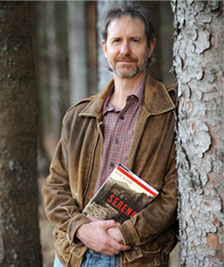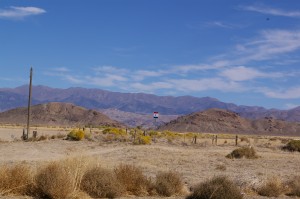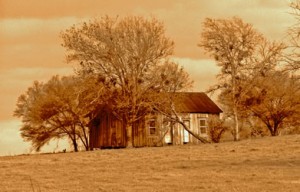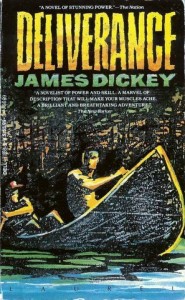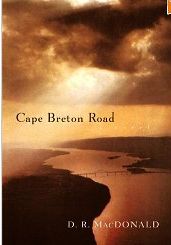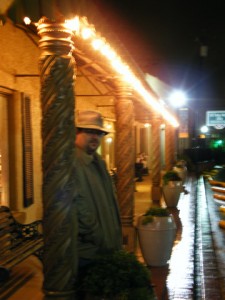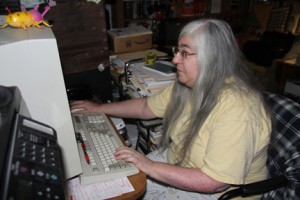Dan says he’s getting tired of me talking in my sleep. Says I mumble like a child and toss and turn, flail my arms. What I see is the inside of the school bus. I see forty kids laughing. Then the bus tilts and the laughter stops. Water rushes in like a biblical downpour and everything goes murky brown. My son, Samuel, is there. Samuel swallows water. He gulps it down like maybe that’s the only way he can save himself. The last vision I always have is the bottom of his boots sucked out a window like he weighs nothing at all, my nine-year-old son vanishing into a swirl of muddy water.
It’s been almost a year since it happened. One year and Dan thinks I should let it go.
“Misery ain’t but ankle deep, Della,” he tells me. “We’ve done our mourning.”
Thing is, Samuel doesn’t whisper to him. He doesn’t cry and tell him to come visit.
My husband doesn’t feel the water rushing around his body. Samuel doesn’t talk to him.
He talks to me.
It had been raining hard for around a week when the wreck happened. The deputy for the sheriff’s office told me what he knew. He said Hank Donalds, who owns the junk shop about five miles up the road, slowed down to look at an old Plymouth down in the ditch.
That’s when the school bus came around the curve.
“I suspect the driver didn’t see him in time, and he hit the back of Hank’s truck,” the deputy told us that morning. “Then he must have panicked, swerved across the road, and went over the embankment into the river.”
I just sat down on the floor right in the doorway when he told me. Dan, first thing he did was ask if they had found Samuel’s body.
“Coroner ain’t made any identifications yet. They have thirty-six bodies down at the National Guard Armory. Reckon they’re gonna use that for the time being.”
Dan sniffed twice, said, “I’ll drive out there. Watch her for a spell, will you?”
I just kept sitting there. Everything they said sounded muffled like my ears were plugged up. I couldn’t hear the radio sitting on the desk near the door. It had been playing “Blue Boy” by Jim Reeves when the deputy knocked. The rain had blown in on me and the bottom of my dress was soaked. My eyes stayed fixed on the muddy driveway. The tire tracks from Dan’s truck had cut raised grooves in the wet ground.
The deputy tried to get me back inside, but I wouldn’t budge. Dan ended up coming home and going back to the river seven times. I didn’t go. He only told me once that the searchers hadn’t found Samuel. They never did.
That night, after a failed fight to sleep, I turned over to see nothingness beside me.
Dan wasn’t in bed. His side was cold and the glass of water he always brought with him to drink and then drop cigarette butts in wasn’t on the night stand.
I got up and walked through the house, still in a sleep fog and filled with sadness.
He stood in the living room looking out the rain-wet window. His eyes faced the creek, but it was too dark out to see anything. He tilted his head a little as I came up behind him.
“My Ma, when I was a kid, she told me that one pebble can change a whole puddle,” he said, and I reached up to put my hand on his shoulder. He tensed up more. “A car in the ditch started it, then a junk truck, then a curve, then the river. One small thing and it’s all torn away.”
That night was the last time he talked about it on his own without trying to comfort me or get me to hush.
A couple of weeks later when I could finally bring myself to form words about it, I talked to some fellow out of Frankfort who came all the way to Given to investigate the accident.
“I’m not sure you want to hear all of this,” he told me. I felt lightheaded when he started to talk. I didn’t make him stop. Not once.
He told me that they only found the bus because they saw a body. The body was stuck in the window of the bus. When they were able to get the bus to land, they saw legs and arms sticking out of the mud that had filled up the inside. All those little arms and legs, stuck in the dark mud, reaching up for something – their parents, God, an escape.
Samuel wasn’t there.
The cold clutch of the mud didn’t claim him. The water and its wild current did.The Frankfort man told me this wasn’t just the worst school bus accident in Kentucky
history. He said it was the worst in the nation. He told me how everybody was making suggestions on how to find the body. Some people said that dynamite should be put in the river. They said that firing a cannon over the water would make a body float to the surface. They said a forked tree limb with a bird’s nest on the end would lead to the location of someone that drowned. It was all superstition. Samuel was gone.
A little over half a year later, ‘59, Samuel started talking to me. I had just started a bath and was taking my hair down, leaning back in the tub, when he whispered above the light lapping of the warm water.
Mama, I miss you. I don’t know where I am.
Dan had to pull me out of the bath. I don’t know how much time had passed. He said I must have slipped and hit my head.
“Lucky your fool self didn’t drown,” he said, brushing the wet hair from my face.
Samuel has been talking to me a lot more this year. He wants me to come to the river and see him. Says he will lead me to where he is.
Dad don’t need to come this time. You can visit when he leaves.
Dan is heading out today, carting cattle up to Indiana. That’s all he has been doing since Samuel went away. Taking care of the cows and pigs. Giving them all the attention in the world. Keeps his mind off things. I can’t rightly help him, I guess. He hasn’t touched me with affection since the deputy paid us that visit a year ago. I guess he’s afraid I’ll get with child and the whole grieving process will start over again. I had Samuel when I was twenty-three. Even then, when Dan was thirty-five, he looked and felt fifty. Working stooped in the sun had taken its toll on him, but raising Samuel turned his calendar back to spring for all of those nine years. Dan says he’s too old now, anyway, too old to have anything to offer a child just coming into this world.
***
The summer before Samuel was lost to us, Dan taught him how to care for the livestock.
On the hottest day I ever remember stepping into, I took them iced tea and a couple of bacon and tomato sandwiches. They were sitting on the fence that started at the corner of the barn and ran along about ten feet away from the creek. Samuel was watching the cows as they swatted tails at the flies that swarmed their flanks.
“The hotter it gets the more water them cows will swallow down,” Dan said to him. “Sam, ain’t nobody wants a dried-out cow.”
Samuel laughed and reached for the glass of tea.
“See, they get all sick from the heat and then they won’t eat,” Dan said, and took a bite of the sandwich. “You want ‘em to grow, you keep plenty of cool water around.”
“How about tea?” Samuel asked, and Dan gave him a little push that sent him off the fence and into a pile of hay.
I see him falling, arms and legs flailing and kicking in the air. My memory becomes blurry and everything turns brown. Samuel stays in the air, but the smile is gone from his face. His mouth is open, his eyes are wide. The hay blows around him in the brown air, then everything starts moving again and Samuel hits the ground, flapping his arms at his side, the smile back on his face. He laughs and laughs.
“Can you reach me my glass, Mama?” Samuel asked.
We were all laughing while the sun scorched us. That was our last summer with Samuel.
***
I walk into the bedroom as Dan’s getting a couple of coats out of the closet.
“I might be gone for a couple of weeks,” he says. “Me and Roger Varney are going to the auction while we are up there. Thing runs around a week or longer. Saw Al Finch down at the store yesterday. He told me they have pretty good deals on steers. I never thought that old sorrow soaker would leave his house, let alone get up to Indiana.”
“He used to live there, I think,” I say. I think about Finch. I know why he seems swollen with sorrow, but I could never bring myself to tell Dan.
He puts one boot on and reaches for the other, looking up at me.
“I don’t like leaving you here by yourself, but you never was much on long trips,” he says. He slides the other boot on, stands up, and stomps his feet on the floor. He walks over to me and wraps his arms around my waist. I think he’s going to kiss me. It’s been so long. But he just squeezes a little and pulls away like he didn’t mean for the hug to happen. His button-up flannel shirt smells like Old Spice and farm sweat. I want to bury my face in it, to have him really hold me again. I start to reach for him but my arms go limp at my sides.
“I’m going to run down to the store and get some extra feed. Bailey Parker’s boy said he would take care of the hogs and cows while I was gone,” he says. “Keep an eye on him, though. He might try and steal us blind.”
“Do you want me to fix supper before you leave?” I ask.
“Naw,” he says. “I’ll just pick up a couple sandwiches at the store while I’m there. I’ll probably head on out once I put the feed in the barn.”
“All right,” I say.
“You get too lonely and you call your sister,” he says. “Get her to come over and spend a couple of nights. Maybe even get her to help clean house.”
“All right,” I say.
He walks over to the dresser mirror and runs a comb through his thick, gray-brown hair.
“I’m gone,” he says, nodding at me. He stands for maybe a second and then swings open the screen door and vanishes around the corner of the house to where his truck and trailer sit. I listen for a minute before I hear the engine rumble to life. A couple of the cows make questioning moos as he backs out of the driveway and starts down the road.
I go over to the closet and get out the broom and dustpan. I just hold them for a while and look out the screen door, watch the clouds. They scoot fast across the sky like they have somewhere to be. Some of them are going black, filling up with water. I put down the dustpan and sweep.
I’m still sweeping through the silence of the house when I hear the truck drive up to the barn. Pulling back the curtain gives me a view of Dan without him being able to see me. He has two sacks of feed, one on each shoulder. He walks in the barn and comes back out in a few seconds. Leaning against the door, he lights a cigarette and stares down the road that leads to our house. His gaze stays fixed for a few minutes, then he glances at his watch, looks up at the sky, and stubs the still smoking cigarette under the heel of his boot. He doesn’t look back at the house. Opening the door to the truck, he climbs in. He hadn’t shut off the engine. He turns around, careful to mind the trailer, and pulls away.
I put the broom away and get a glass of water, drink it down in a couple of gulps. I get my nerves about me and walk to Samuel’s room. We haven’t changed a thing in it. Dan wanted to put things in storage, but I just couldn’t do it. This was Samuel’s room, and it will always be his. Dan doesn’t come in here. I only do it when he’s gone. He thinks it’s bad for me to look at Samuel’s things and think about the way things were. The bed’s neat and made, sheets and quilt tucked tight by his own hands that morning he left for school. A charcoal drawing set sits at an angle on his desk along with a half-finished drawing of a cowboy. A comic book, Zane Grey's Stories of the West, has fallen off the dresser. The house shakes sometimes from the blasting at the mines. It probably jarred it to the floor. Samuel wouldn’t have left it there. I kneel down at the foot of his bed and thrust my hands under it, coming back with an album of photographs.
I open the album and everything starts to move in my head. The pictures come to life as I look at them and close my eyes, letting the images flood my mind.
Samuel comes running from the creek holding a snapping turtle by the tail. His wet-straw hair dripping on his forehead, streaks of mud on his legs.
“It ‘bout drug me in!” he says, out of breath.
“Lord, you’re a mess,” I say.
Dan comes out of the house with the camera that his Uncle Paul lent him.
“Boy, I told you to catch us some fish for supper, not reptiles,” he says, and starts laughing.
“I caught him with bacon,” Samuel says. “ Couldn’t find no worms to fish with. Birds must’ve got all of ‘em.”
“You mean you took good bacon from the freezer and it ended up in that dirty old creek?” I say, half-sternly.
The turtle snaps at me, and Samuel smiles.
“He ain’t going nowhere, Mama,” he says, showing his grip on the tail.
“Want me to clean it and have your mama fry it up for supper?” Dan asks.
“I don’t think so,” Samuel says. “I’m going to take him back.”
“Well, don’t fall in this time,” I say. “You’re already going to have to scrub with a wire brush.”
Samuel snickers and streaks away.
“Let’s go swimming,” he yells.
“You know your mama can’t swim,” I yell after him.
“You can learn,” he says, vanishing down the embankment to the creek.
I open my eyes again and realize I’ve been crying. The buildup of tears make tracks down my face and into my mouth.
I miss you, Mama.
The day before Samuel was gone forever, I had to spank him. It wasn’t the first time, and I remember thinking it wouldn’t come close to being the last, but it sticks with me. I hope he forgave me before he went to sleep that night.
I was outside filling the cow trough with water. The trough was nailed to the old fence to keep them from tipping it over, so I was just leaned over the fence and dumped the water in to keep from having to get in the pen with them because it was pretty muddy. I leaned over with the last bucket of water when something hit me from behind and I flipped over the fence and half of me landed in the trough. My legs sprawled out in themud. Wiping the water from my eyes, I saw Samuel laughing. I got so mad that I jumped up and came straight back over the fence, grabbing him by his shoulder.
“That wasn’t funny,” I yelled, and spanked him hard with my hand.
“It was just a joke,” he said, tears already streaming.
I slapped his bottom again, harder this time.
“It was just a joke!” he yelled, and I swatted him again.
“You don’t raise your voice at your mother!” I screamed.
I didn’t let him listen to the radio that night, or read one of his cowboys and Indians comics. I made him go straight to bed.
It was just a joke, Mama.
***
I slide the album back under the bed and stand up too fast. I stagger a little and finally regain my balance. Now’s the time to go. If I walk down to the store, then maybe I can get Jeff or Rita to give me a ride. They used to give me and Samuel rides into town when Dan was gone on his trips. The store is only about a fifteen-minute walk from here. My legs are strong. We used to walk down there almost every day. I would buy him a Coca-Cola even though I knew it wasn’t good for him. I realize I’m crying again and decide to get going while I can.
It doesn’t take me long to get to The Hitching Post where they sell farm supplies and a few groceries. The only car parked outside is an old Plymouth that belongs to Albert Finch. Finch just moved to town a couple of months before Samuel went away. He has family around these parts, so he came to town quite often before deciding to move here. He keeps to himself for the most part, but he’s always been nice to me. Even bought a couple of hogs off Dan last summer when things were a little tight for us. I walk in the store, and Albert is sitting on a wobbly barstool wolfing down a sandwich. He has an unlit pipe in one hand and the quickly vanishing sandwich in the other. He’s wearing a suit, wrinkled, and the knees of the pants are dirty. A felt hat rests on his lap. His hair’s white and slicked to his head. I watch his mustache move up and down as he chews. I look around, but nobody else is in the store. I know that Albert has to take me to the river.
I know, and, deep down, I think Albert knows. I know because of what Hank Donalds told me two months after the accident.
“It was old Al Finch that I had to pull out of the ditch,” Hank told me. “He said a box of books slid out of the seat and he tried to catch them. Caused him to run off the road. Don’t reckon he will ever be the same. He’s taking it hard, Della.”
Watching Finch, I feel no anger toward him. He’s just part of it all, like me and Samuel.
“How’re you, Della?” he asks, turning around when the bell at the top of the door starts tinkling.
“I’m fine, Mr. Finch,” I say. “I was wondering if you would mind much about giving me a ride out to the river.”
“I wouldn’t mind,” he says. “But I must say I’m a little curious. It’s getting dark.”
“You know already,” I say.
“I suspect I do,” he says. “But I don’t like to take everything I hear to heart.”
“Chances are you heard right in my case,” I say.
People around here started talking not long after the accident. They made note of each time I didn’t come to town with Dan. My sister, Val, told me all about the things she heard them say. They said I went plum crazy, locked myself in Samuel’s room. A few of them said I went down to the river every night and looked for him. They said all kinds of things.
Finch pushes the rest of the sandwich into his mouth and grabs a Coke from the cooler. He opens the bottle with the heel of his boot.
“Don’t know where Jeff and Rita are. They made me a sandwich, and I haven’t seen them since. About time for them to close up shop anyway,” he says.
He takes a long drink and starts to put the bottle on the floor but his hands start shaking. I reach and get the bottle, putting it on a shelf behind him.
“Nerves,” he says, rubbing his white mustache with his sleeve. “Had ‘em ever since I was a kid. The shakes, you know. You can have a drink if you like.”
“Thanks, but I’m not thirsty,” I say, looking at the crumbs still stuck in his white whiskers.
I’d never noticed how old Finch was until now. The deep creases next to his crawling white eyebrows, his muddy brown eyes and age spots on his hands – all this said he was at least sixty. Probably older. I get the feeling that it all has taken just as much of a toll on Finch as it has me and Dan. Keeping it inside himself, he looks so worn out. It was his car, but not his fault. I want to tell him that. I think he wants me to tell him that.
He wipes at his mouth again with his sleeve and then slowly stumbles from his seat.
“It’s no trouble to take you, but I’d like to know what you have in mind,” he says.
“Dan doesn’t want me to go. Says I’m too frail, too emotional. I can’t get over things.”
“I see,” he says, putting tobacco in his pipe. “Do you feel guilty for not going?”
“Yes,” I say. “I think if I just see it, see where it happened, maybe I can rest.”
“I can’t rightfully argue with that,” he says, and blows smoke.
Finch puts the felt hat on his head and starts shuffling towards the door.
“I’ll have to clean out a place for you,” he says.
He opens the passenger door of the Plymouth and bends down with a deep groan.
He lifts a box up off the seat.
“What’s that?” I ask.
“Comic books,” he says. “It’s a fool thing for an old man to have, but I like to read them when I’m just sitting around. That, as you probably guessed, is a lot of the time. I’m that way with everything I like. Can’t bring myself to get rid of it when I’m through. I’m a pack rat, can’t help it. Since I’m not used to having passengers, I treat this old thing like my storage room.”
I glance at the box and see The Lone Ranger, Tales of the Unexpected, and Casper the Friendly Ghost. I think about how much Samuel would have liked Finch. He would have given Samuel his old comics, told him about the good new ones that were coming out. Uncle Albert, Samuel might have called him.
He hefts the box up on his shrinking shoulders and takes it around to the trunk.
Finch's car, which I thought was silver, is a dull gray. It might have been silver when it was new, but now it’s washed out. It looks like it has been stripped of all color.
I sit down and the seat squeaks, reclining a little as I adjust myself. The inside of the car smells like pipe smoke and potting soil. A damp, old scent.
Finch pushes down on the trunk and then makes his way to the driver's door. He has one hand on his back and is stooped over.
"Thank you for doing this," I say.
"It's no trouble," he says. "Gives me a little company. Something to do."
He turns the key and the Plymouth jerks to life without hesitation.
"I think you're doing the right thing," he says. "Grief can grow like a garden. My mother used to tell me that. If you get a chance to put things right, you should take it."
"He talks to me, Mr. Finch," I say.
"I have no issue in believing that," he says.
"You're the first person I've ever told. Do you have children?"
"No, and I will be regretting it soon enough. I already do, a little, but I'm on the way downstream in my life now and there's nobody with me."
"Are you married?" I ask.
"I was. She passed a little over seven years ago. Disease of the heart. It came so quick."
He stops talking and concentrates on the sharp succession of curves that wind the road near the river.
I watch his hands grip the steering wheel. Thick veins crisscross near his scabbed knuckles. The last of the sunlight shines through the windshield and graces the tips of his fingers.
"Betty always wanted a little girl," he says, clearing the last curve. "But, for some reason, we just couldn't conceive. Neither of us wanted to go get checked out. I guess we both were afraid to find out whose fault it was. Afraid we might resent the other one for it, you know."
"Dan doesn't want another child," I say.
I look down at the white hem of my dress. This is the first time I have worn it since I sat in the doorway and got soaked by rain. Dan told me he liked how the blue matched my eyes when I tried it on. I remember he kissed me and called me his blue lady.
I reach back and pull the pin from my hair. It falls down to the top of my shoulders. Finch doesn't take his eyes off the road.
"So, Dan is on his way to Indiana with some livestock. Is that right?" Finch asks.
"Yes,” I say. “How did you know?”
"I was at the Hitching Post when he came in for feed," he says.
"Oh, yes. He mentioned he saw you yesterday too. You must stay there all the time," I say.
"I don't do much, Della. If I find a place I like then I tend to stay there for a while. I like hearing the people that come in tell stories. They make some good sandwiches, too. Dan asked me if I would like to go, but I’m not much for long trips," he says, slowing down to avoid a pothole.
"You can pull off here," I say. "It's pretty close, and I want to walk a little anyway."
He turns his head and looks at me for the first time since we started driving.
"Do you want me to wait on you?” he asks. “I will. I don't have any plans."
"I'll be okay,” I say. “I need to do this by myself. I think that’s what Samuel wants.”
"I'll come back in about an hour to pick you up, then," he says.
"No, that's okay. I'll find my way home," I tell him, reaching for his hand.
Finch uncurls his fingers from the wheel and starts to shake my hand, but his entire arm goes into spasms and he pulls away.
"Nerves," he says. "Be safe, Della."
I tell him thanks again and open the door. It has started to rain, just a light drizzle. I smooth out my dress and start to push the door shut.
“Della,” he says. “I want to tell you something.”
“It wasn’t your fault, Mr. Finch,” I say.
He closes his eyes and starts to tremble. I put my hand on his shoulder and look at him one more time before stepping out of the car.
I wave goodbye and then start walking, looking for a place where I can safely make it down the hill to the riverbank. Finch blows his horn once, sticks his hand out the window and waves. His face is somber, worried. I walk for a few minutes and turn around to look. Finch still watches, and I imagine he’s considering coming after me. When I find a place to go down the embankment, I wave my hand at him. He finally backs up and drives away. I know he will just circle the river and watch. He will try and find a place where he can reach me if something happens, hoping that his car is hidden in the graying approach of night.
I find a clearing that looks like a path beaten down by persistent fishermen. I pull the bottom of my dress up to my knees and slide-walk as carefully as I can. I slip down the embankment and almost fall. The hill is wet from rain, the dirt loose. I pull off my shoes and put them on top of a large sandstone. My eyes turn to the river. The water is fast and brown. I pick my shoes back up and sit down on the rock. The brown water of the river runs hard, the waves reminding me of something alive and trying to escape its banks. Some of the trees on the bank have roots that are out in the open. When the river floods, it always eats the soil and cuts back under the road. The wind picks up, and I can feel a cool mist on my neck. It’s October and the rusted leaves on the pained trees lining the bank are starting to die.
I hear a rustle to my right and I turn to look. A small bird takes two hop-steps and lands on a sandstone, tilts its head and examines the river.
“Get,” I say, and wave my arms at it.
The bird takes flight and heads back towards the trees that cover the mountain on my side of the river. I watch it until the small brown body disappears into the dying leaves. I stand up and look around. It’s almost dark. I must have been here for over an hour just watching the river run. I close my eyes for a second and then step into the water. It’s the coldest thing I have ever felt. My legs go numb, and I wonder if I can wade out any farther. I take a few more steps. Tiny minnows swim around my feet before darting off into deeper waters. I think about Samuel catching them out of the creek with the bucket that Dan uses to feeds the cows.
The bottom of my dress clings to my legs. I back out of the water and walk over to the sandstone. I pull the dress off and fold it, placing the shoes on top so the wind won’t send it billowing away. I do the same with my underthings. My eyes find the river again.
It’s okay, Mama. You can swim.
Walking fast into the river, I twist my hips to make sure the current doesn’t grab hold of me. The water is up to my shoulders when I notice the headlights on the road along the other side of the river. I hear the faint rumble of an engine bouncing off the mountain. I strain my eyes and can make out a figure sitting on the hood of the car. Finch adjusts his hat and then remains still. I look away, focusing back on the water. I can’t leave yet.
The churning water caresses me, and I feel unexpectedly warm. I take another step. My feet start to slide on the mud-slick bottom. I catch myself for a second and imagine Dan’s arms around my waist, pulling me back. My eyes catch the glow of the headlights again, and I wish they belonged to Dan’s truck. But this is the way it has to be. Finch hops down from the hood of the Plymouth.
You can swim, Mama.
My feet slip again, and the water goes over my head. Everything is a rushing, roaring darkness. My ears plug up, so all I hear is my heartbeat thunder-clapping inside my skull. My legs fly off the silty bottom and sprawl out in front of me. I spin and try to stand. A sudden force slings me sideways, and I’m gone. The muddy water washes into my eyes like a sink drain. I blink and blink, but it does no good. I hope to turn my head and see Samuel. I want to reach out for him, catch his hand in mine, but I see what he saw. The rolling darkness of the water’s all there is. This is the last thing my son was able to see. I imagine Samuel tumbling along beside me, we are traveling the river together. His hair stuck to his forehead, mine flailing wildly, we smile at each other. The vision leaves me as Samuel is jerked away by the rushing river and disappears, gone from me again. My head bobs above the water once, and I see Finch sliding down the embankment, his arms making frantic movements as he tries to keep his balance.
“Della!” he yells.
He runs along the edge of the water trying to catch me, but the water carries me like a leaf, away from Finch’s shaking, outstretched hands.
I try to grab a tree branch as I swirl by, but it’s no use. The water whips me past the wooden cross rammed in the ground at the spot where the bus sailed over. I open my mouth and drink.
 Jarrid Deaton lives in eastern Kentucky. His work has appeared in mud luscious, > kill author, Underground Voices, Thieves Jargon, and elsewhere.
Jarrid Deaton lives in eastern Kentucky. His work has appeared in mud luscious, > kill author, Underground Voices, Thieves Jargon, and elsewhere.



